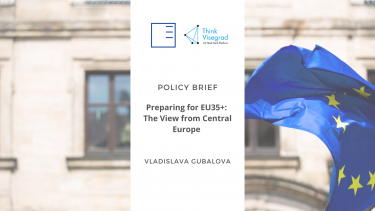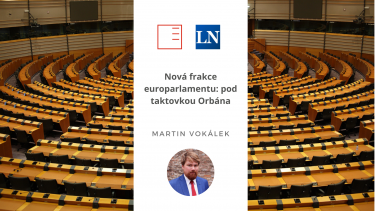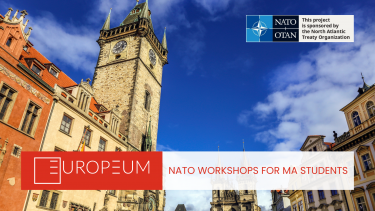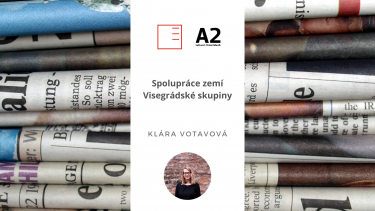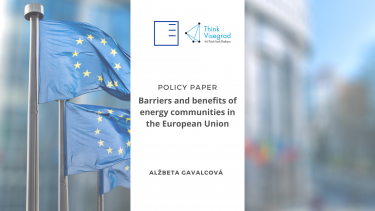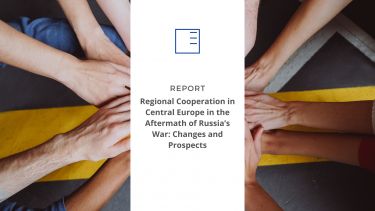Policy Brief | Preparing for EU35+: The View from Central Europe
Despite the historical support of EU enlargement policy by the Visegrad Four (V4), these Central European states are now faced with the challenge of reconciling their stances with the new realities of the process. As Ukraine and Moldova opened their accession negotiations, the EU seems to be torn on the questions associated with the future enlargement(s) - institutional reforms and changes within the EU budget. Transitioning from economic beneficiaries to potential contributors, the V4 states must evaluate the potential political and economic impacts of new members on both the EU and their domestic levels. Writes and proposes recommendations Vladislava Gubalova from GLOBSEC.
Show moreLidovky.cz | New political group in the European Parliament: under the baton of Orbán
Visegrad sovereigntists. This is the name given by European circles to the upcoming new faction of the European Parliament, which is expected to include seven MEPs from the Czech ANO movement. The leader of the Czech opposition, Andrej Babiš, who led his MEPs out of the influential liberal Renew Europe, is working with Hungarian Prime Minister Viktor Orbán to establish the new group. Martin Vokálek, director of EUROPEUM Institute, comments on its formation.
Show more
Call for Participants: Euro-Atlantic Future of Ukraine and Eastern Europe: Views from Visegrad
Are you a Master’s student from the Czech Republic, Hungary, Poland, Slovakia keen on international relations and NATO's strategic future? Join our workshop series to engage with experts, present your views on NATO’s Open-Door policy, and network with peers from the region.
Show more
A2 | Cooperation of the Visegrad Group
Cooperation inside the Visegrad Group depends on the political situation of each country. In recent years, the alliance has drawn attention to itself with its criticism of the southern European states and anti-immigrant rhetoric. Klára Votavová, a researcher at EUROPEUM Institute, wrote her commentary for the biweekly A2.
Show morePolicy Paper | Barriers and benefits of energy communities in the European Union
Energy communities are an effective means to decentralize and renew our energy systems with sustainable solutions as they are usually based on renewable energy. They have already started emerging in 1970´s, yet there has been a significant increase in their development only in recent years, also in terms of their introduction into the EU legislation. Especially in Western and Northern European countries the concept already enjoys vast popularity. On the other hand, in Central and Eastern European countries (further referred to as CEE) energy communities are only beginning to emerge. The policy brief (based on literature and interviews with various stakeholders ) examines the benefits energy communities may bring, and more importantly, the main obstacles remaining in their way for greater evolution in the CEE region – and especially Visegrad countries (V4). As these initiatives progress, sharing the best practices will ensure the success of the community energy in the energy transition. Writes Alžbeta Gavalcová.
Show moreReport | Regional Cooperation in Central Europe in the Aftermath of Russia’s War: Changes and Prospects
On April 18th, EUROPEUM’s Brussels Office in partnership with PISM Brussels Office under the Think Visegrad platform hosted a discussion titled “Regional Cooperation in Central Europe in the Aftermath of Russia’s War: Changes and Prospects”. This event was attended by 15 experts from think tanks and representatives of EU institutions.
Show moreThink Visegrad Fellowship offer: Call for proposals 2024
The Think Visegrad platform, which brings together think tanks from the Visegrad countries, including the EUROPEUM Institute for European Policy, is offering eight visiting fellowships to non-Visegrad expert fellows for the period Summer/Autumn/Winter of 2024. The duration of fellowships varies from 6 to 8 weeks (based on agreement with the hosting institute).
Show moreThink Visegrad conference - EU Enlargement Forum
On 10 and 11 April 2024, Prague will host a two-day conference entitled "20 Years of Reuniting Europe's East and West", organised by EUROPEUM Institute for European Policy in cooperation with the Ministry of Foreign Affairs as part of the Think Visegrad platform and the project (Re)uniting the East and West: Reflections on the 2004 EU enlargement (REWEU) supported by the International Visegrad Fund and the European Commission. The programme will also include the second edition of the EU Enlargement Forum.
Show more
TN.cz | Meeting of the Visegrad Group Foreign Ministers
The current format of the Visegrad Group lacks common topics; the group fragmented into two pairs that have different opinions in many areas, particularly regarding the issue of Ukraine. However, the interests of Hungary and Slovakia are not in conflict with others, despite what their leaders claim. The conflict in the Middle East, where the Czech Republic is in the minority in its full support of Israel, was also discussed on this meeting. Viktor Daněk, deputy director of EUROPEUM Institute, commented on the situation within the V4 for TN Live.
Show moreVisegrad/Insight | Tractors Trending: V4 Populists Appropriate the Farmers’ Protests Ahead of the EP Elections
The populist camps in the Visegrad Four countries have used the farmers' protests in their populist campaigns for the European Parliament elections in June. A fundamental change to the last EU elections in 2019 is visible in the politicians' messages towards the people, with social media taking over the classic platforms such as television, press or radio. Project Manager of Global Europe programme at EUROPEUM Institute, Oszkár Roginer-Hofmeister, wrote an article on this topic for Visegrad/Insight.
Show more
Staroměstské náměstí 4/1
Prague 1 - Staré Město
110 00
tel.: +420 212 246 552
email: europeum@europeum.org
https://www.europeum.org
